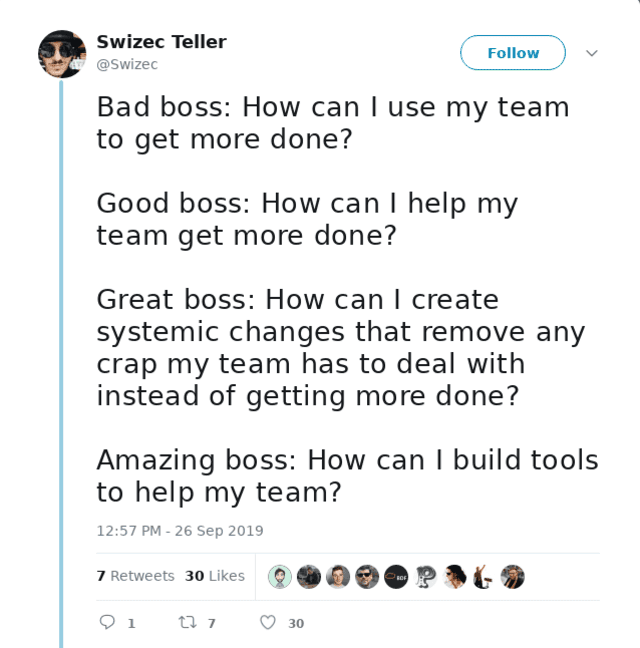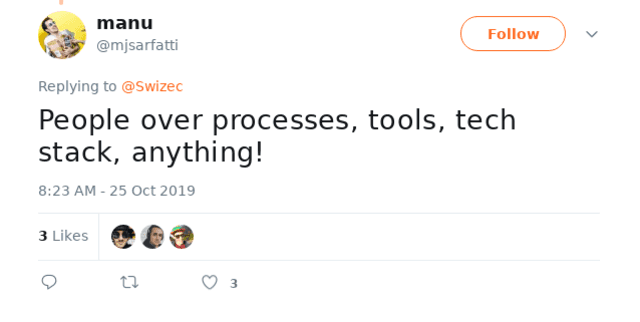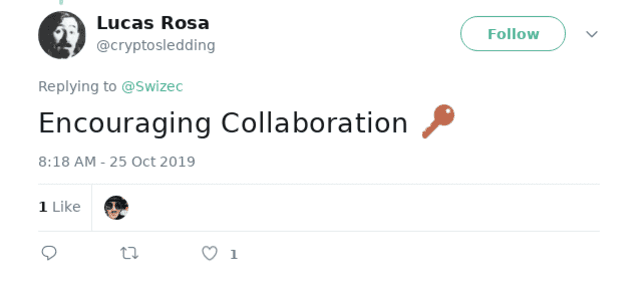
You've just been handed a big project at work. It spans parts of the app you've never touched, tech you've never heard of, and it all needs to work together in one big unified feature.
But fear not! Bob's gonna help with iOS, Kevin has Android, Stuart's doing backend, and you've got the webapp. You got dis! 💪
Congratulations, you just became Lead Engineer on a project. You're nobody's boss and it's your fault when something goes wrong.
Yes, your fault. Not your team's, not your boss's, yours.
Extreme Ownership is a book you should read. Here's a TEDx recap from the author. Ignore the navy seal hardass delivery.

I've been leading projects more and more this year as our team grows and the folks with "manager" in their title become too busy. It's been both empowering and frustratingly humbling.
My last project was so smooth I think I finally figured out how to lead well. Here's what I've learned 👇
How to succeed as a lead engineer
As lead engineer you are straddling the line between management and engineering. Your job is to do your work, write your code, oh and also you're responsible for the whole project and everybody else's work. Good luck.
You often have no power – you don't choose your team, you don't hire anyone, you don't pick what to work on ... you manage the project, not the people.
Ever noticed how there's no project managers in Silicon Valley? This is why. Engineers are project managers.
Because you're lead engineer your main work is still writing the code. You are expected to focus on implementing the feature, making tests pass, getting through code review.
Managing the project is just tacked on top. It won't show up in your sprint, time will not be allotted. You just gotta find it.
But come review time all your manager is going to ask, or know, is "Was that project successful?"

Doesn't matter if you wrote the best code of your life and everyone else produced crap, or you wrote shit code and managed everyone else to excellence. Project failed.
Your objective is a successful project
Make sure you check with your boss to know what that means. "What does success look like?" is the most important question in your arsenal when starting any project.
It's a shift in mindset

Once you realize your goal is a successful project, not great code, everything changes. What can you do to make this smoother?
Your role is that of a force multiplier.
In military science, force multiplication or a force multiplier refers to a factor or a combination of factors that gives personnel the ability to accomplish greater things than without it.
What can you do to make everyone else better?

The best way to become a 10x engineer is to find 10 engineers and make them 2x. That's your role as lead. Making your team kickass.
Your team is likely smaller so maybe aim for 5x? 😛
What this means is that you will have to deprioritize your own work in favor of everybody else's work. Somebody blocked? Help them. Decision needs to be made? Help. Code review waiting for ya? Do it now, not later. Stuff needs to go into QA? Do it.
Your job is to take on the crap work nobody else wants to do.
That means organizing discussions, keeping everyone in sync, dealing with QA, getting product signoff, organizing deployment, carrying that project over the finish line no matter what. All the stuff that makes you groan and wish you were writing code.

So what do you do
Mindsets and objectives are nice, but what do you do? We're engineers, we like details.
You can read this section as an SOP – standard operating procedure. It's what I've found works for me and something I hope others on my team use as a guideline. Hi Pru 👋

Create a Slack channel
Or email thread, or whatever your team uses for communication. You need a central place for everything to do with a specific project. All async communication goes there. All in-person communication gets a recap there.
This will be invaluable later on when something goes wrong and you want to see what the fuck happened. If you didn't write it down, it didn't happen.
Humans forget everything.
Keep a checklist
Ask your team to break down their part of the project as much as they can. You can attach estimates to each line or not. I personally find them useless but my bosses love seeing those imaginary numbers. 🤷♀️
Add a checkbox next to each line. When a task gets done. Check it off.
This creates an overview at a glance for all stakeholders. Someone wonders how the project is doing, how close to completion y'all are 👉 check the checklist.
Your boss will ask you less often how it's going because they're already gonna know.
Daily standup
Create a daily standup. In person if that's your culture, over video, if you're remote.
This is a quick sync up, 5 minutes or less. Chat about the project, discuss any issues, get an update on how everyone's doing. Build a team spirit. We're all in this together and we all want the project to succeed.
There is no judgement, no guilt, only facts.
Some management theories say standups are about making people feel guilty for not being as productive as their peers so they'll work harder. That shit is bullshit.
Post a standup recap
Only those actively working on the project today should participate in your standup.
The smaller the standup, the faster it's gonna go. You don't need everyone there in person. Sometimes they just need to know when they can start working on their part.
Don't waste people's time.
Instead, after standup, write a short recap summarizing the project status. Post it in the common communication area you created earlier.
To quote my wonderful PM:

That's the goal right there.
Added bonus: your boss won't bug you for updates. They can read the standup recap
I like to split the recap by person for accountability. Stuart did so and so, Kevin got this far, Bob was stolen from us by a production issue.
Delegate
This is your new super power. As lead, you get to delegate.
Delegating is hard. It means letting go of your babies, letting others play with your legos, and stepping away from some of the work.
But it's okay, they're great engineers and they're gonna do it even better than you could have.
You're delegating everything you can't do. Those parts of the feature you aren't owning anyway. Your job there is to provide clarity, help with organization, and hope for the best.
But you should also delegate some of the things you can do. Because others can do them better.
Coming up with examples is tricky, you'll know it when you see it :)
Communicate like a boss
This is more general advice but I like it a lot. A few turn-of-phrase hacks you can use to make everything flow smoother.

Ask for updates and always follow up. When something's done congratulate, when something falls behind ask why.

And remember, a well managed team will out-code you any day of the week.
Cheers,
~Swizec
PS: I crowdsourced some of the ideas, you can check out this thread on twitter for more wisdom
Continue reading about How to succeed as a lead engineer – tactics and mindsets from practice
Semantically similar articles hand-picked by GPT-4
- How to own projects like a senior engineer
- Be their shit umbrella
- It's like surfing
- There are no bad teams
- How to lead a project
Learned something new?
Read more Software Engineering Lessons from Production
I write articles with real insight into the career and skills of a modern software engineer. "Raw and honest from the heart!" as one reader described them. Fueled by lessons learned over 20 years of building production code for side-projects, small businesses, and hyper growth startups. Both successful and not.
Subscribe below 👇
Software Engineering Lessons from Production
Join Swizec's Newsletter and get insightful emails 💌 on mindsets, tactics, and technical skills for your career. Real lessons from building production software. No bullshit.
"Man, love your simple writing! Yours is the only newsletter I open and only blog that I give a fuck to read & scroll till the end. And wow always take away lessons with me. Inspiring! And very relatable. 👌"
Have a burning question that you think I can answer? Hit me up on twitter and I'll do my best.
Who am I and who do I help? I'm Swizec Teller and I turn coders into engineers with "Raw and honest from the heart!" writing. No bullshit. Real insights into the career and skills of a modern software engineer.
Want to become a true senior engineer? Take ownership, have autonomy, and be a force multiplier on your team. The Senior Engineer Mindset ebook can help 👉 swizec.com/senior-mindset. These are the shifts in mindset that unlocked my career.
Curious about Serverless and the modern backend? Check out Serverless Handbook, for frontend engineers 👉 ServerlessHandbook.dev
Want to Stop copy pasting D3 examples and create data visualizations of your own? Learn how to build scalable dataviz React components your whole team can understand with React for Data Visualization
Want to get my best emails on JavaScript, React, Serverless, Fullstack Web, or Indie Hacking? Check out swizec.com/collections
Did someone amazing share this letter with you? Wonderful! You can sign up for my weekly letters for software engineers on their path to greatness, here: swizec.com/blog
Want to brush up on your modern JavaScript syntax? Check out my interactive cheatsheet: es6cheatsheet.com
By the way, just in case no one has told you it yet today: I love and appreciate you for who you are ❤️

